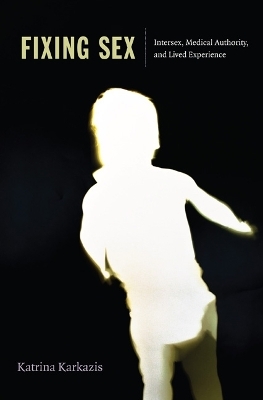
Fixing Sex
Duke University Press (Verlag)
978-0-8223-4302-8 (ISBN)
- Titel z.Zt. nicht lieferbar
- Versandkostenfrei
- Auch auf Rechnung
- Artikel merken
What happens when a baby is born with “ambiguous” genitalia or a combination of “male” and “female” body parts? Clinicians and parents in these situations are confronted with complicated questions such as whether a girl can have XY chromosomes, or whether some penises are “too small” for a male sex assignment. Since the 1950s, standard treatment has involved determining a sex for these infants and performing surgery to normalize the infant’s genitalia. Over the past decade intersex advocates have mounted unprecedented challenges to treatment, offering alternative perspectives about the meaning and appropriate medical response to intersexuality and driving the field of those who treat intersex conditions into a deep crisis. Katrina Karkazis offers a nuanced, compassionate picture of these charged issues in Fixing Sex, the first book to examine contemporary controversies over the medical management of intersexuality in the United States from the multiple perspectives of those most intimately involved. Drawing extensively on interviews with adults with intersex conditions, parents, and physicians, Karkazis moves beyond the heated rhetoric to reveal the complex reality of how intersexuality is understood, treated, and experienced today. As she unravels the historical, technological, social, and political forces that have culminated in debates surrounding intersexuality, Karkazis exposes the contentious disagreements among theorists, physicians, intersex adults, activists, and parents—and all that those debates imply about gender and the changing landscape of intersex management. She argues that by viewing intersexuality exclusively through a narrow medical lens we avoid much more difficult questions. Do gender atypical bodies require treatment? Should physicians intervene to control the “sex” of the body? As this illuminating book reveals, debates over treatment for intersexuality force reassessment of the seemingly natural connections between gender, biology, and the body.
Katrina Karkazis is a Senior Research Scholar in the Center for Biomedical Ethics at Stanford University.
Acknowledgments ix
Introduction 1
Part 1. What is Intersexuality? History and Theory
1. Taxonomies of Intersexuality to the 1950s 31
2. Complicating Sex, Routinizing Intervention: The Development of the Traditional Treatment Paradigm 47
3. From Socialization to Hardwire: Challenges to the Traditional Treatment Paradigm 63
Part 2. Making Decisions For and About a Baby with an Intersex Diagnosis
4. Boy or Girl? Bodies of Mixed Evidence and Gender Assignment 89
5. Fixing Sex: Surgery and the Production of Normative Sexuality 133
Part 3. Living the Medicalized Body
6. Waning and Deciding What is Best: Parents' Experiences 179
7. Growing Up under the Medical Gaze 216
8. The Intersex Body in the World: Activism and Social and Medical Change 236
Notes 291
References 321
Index 343
| Zusatzinfo | 1 table |
|---|---|
| Verlagsort | North Carolina |
| Sprache | englisch |
| Maße | 156 x 235 mm |
| Gewicht | 689 g |
| Themenwelt | Medizinische Fachgebiete ► Chirurgie ► Ästhetische und Plastische Chirurgie |
| Studium ► 1. Studienabschnitt (Vorklinik) ► Histologie / Embryologie | |
| Studium ► 1. Studienabschnitt (Vorklinik) ► Med. Psychologie / Soziologie | |
| Sozialwissenschaften ► Soziologie | |
| ISBN-10 | 0-8223-4302-9 / 0822343029 |
| ISBN-13 | 978-0-8223-4302-8 / 9780822343028 |
| Zustand | Neuware |
| Haben Sie eine Frage zum Produkt? |
aus dem Bereich


